2020九年级英语下册 Module 1 Travel模块语法聚焦练习 (新版)外研版
【2020】最新九年级英语下册Module1Travel综合能力演练(含解析)(新版)外研版

2. The room is ______ everything.
A. full with B. fill with C. filled with D. fill of
3. —What will a science museum be like if you are asked to build one?
A.The;a B.The;the C.A;a D.A;the
【真题链接】
1. The stories ______ were written by Mark Twain are often humorous.
A. thatB. thoseC. whoD. what
2. Everybody _________ deeply after they heard the story.
III. 阅读理解。
A
I am off on a trip on my own. Yes! Alone! I can’t wait to get going to Europe to see some cities I really want to visit. It is great because I can choose what I want to do in each city. I am going to travel by train on the Eurorail.
A. Bored. B. Brave. C. Lonely. D. Excited.
B
Two months ago, I went to Australia for a meeting with my workmate, Chris. We decided to drive across country to Brisbane after the meeting ended. The drive was going to take four days and most of it was across the desert. The first day was a lot of fun as we were excited and laughing at each other’s jokes. By the third day of driving in the desert, we began to get bored. We had been quiet for a few hours when Chris saw some kangaroos. We were both excited and decided to get a closer look. Chris drove d put his base ball cap on its head. He took off his sunglasses and put them on the kangaroo and did the same with his jacket. Then, he put his arm around the kangaroo and told me to take a photo of them together. I took out my camera. While I was focusing the camera, I saw the kangaroo move. It suddenly woke up, and ran away before we could do anything. I started laughing but Chris looked very serious. He said his wallet was in the jacket. I started laughing even harder. I stopped laughing, however, when he said that our car keys were also in the jacket!
外研版:2020年九年级下册 Module 1 Travel 课时练习(含答案)
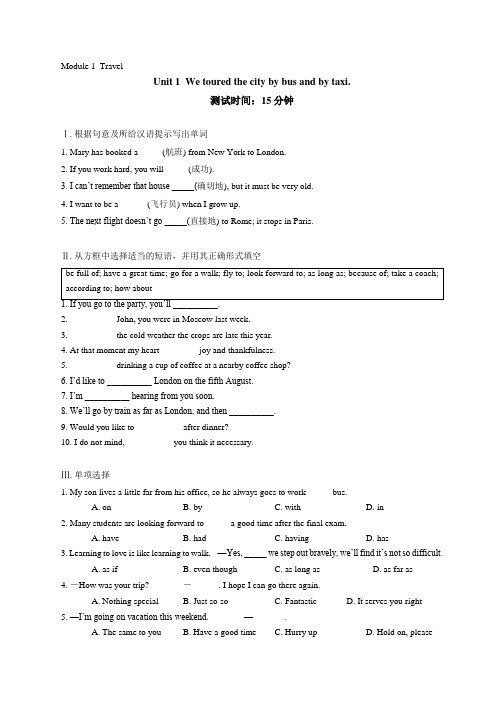
Module 1 TravelUnit 1 We toured the city by bus and by taxi.测试时间:15分钟Ⅰ. 根据句意及所给汉语提示写出单词1. Mary has booked a _____(航班) from New York to London.2. If you work hard, you will _____(成功).3. I can’t remember that house _____(确切地), but it must be very old.4. I want to be a ______(飞行员) when I grow up.5. The next flight doesn’t go _____(直接地) to Rome; it stops in Paris.Ⅱ. 从方框中选择适当的短语,并用其正确形式填空2. __________ John, you were in Moscow last week.3. __________ the cold weather the crops are late this year.4. At that moment my heart ________ joy and thankfulness.5. __________ drinking a cup of coffee at a nearby coffee shop?6. I’d like to __________ London on the fifth August.7. I’m __________ hearing from you soon.8. We’ll go by train as far as London, and then __________.9. Would you like to __________ after dinner?10. I do not mind, __________ you think it necessary.Ⅲ. 单项选择1. My son lives a little far from his office, so he always goes to work _____ bus.A. onB. byC. withD. in2. Many students are looking forward to _____ a good time after the final exam.A. haveB. hadC. havingD. has3. Learning to love is like learning to walk. —Yes, _____ we step out bravely, we’ll find it’s not so difficult.A. as ifB. even thoughC. as long asD. as far as4. -How was your trip? -______. I hope I can go there again.A. Nothing specialB. Just so-soC. FantasticD. It serves you right5. —I’m going on vacation this weekend.—_______.A. The same to youB. Have a good timeC. Hurry upD. Hold on, pleaseⅣ. 根据所给汉语完成下列句子,每空一词1. 你周末过得怎么样?_______ _______ your weekend?2. 这个学期期末有考试吗?Are there any exams _______ _______ _______ _______ this term?3. 你认为他会成功得到那份工作吗?Do you think he will _______ _______ _______ that job?4. 他在城里有一份相当好的工作。
新版外研九年级英语下册Module1 Travel重点知识整理+巩固练习(附答案)

新版外研九年级英语下册Module1 Travel重点知识整理+巩固练习(附答案)重点词组欢迎回来welcome back 还不错not bad充满be full of =be filled with 超过、多于over = more. than由于,因为because of 有点晚a bit late飞回某地fly back to +地名有点儿a bit of + 不可数名词直飞香港fly direct to Hong Kong 成功做某succeed in doing sth.坐船去某地take a boat to sp. = go to sp. by boat 去散步go for a walk玩得很高兴have quite a good time 最好做某事had better do sth.环城市旅行tour the city = take a tour to the city 在学期末at the end of the term 没什么担心的nothing to worry about 只要as long as毕业生晚会the school-leavers’ party盼望(做)某事look forward to+ sth. / doing sth.向某人告别say goodbye to sb. 向某人问候say hello to sb.多保重take care 喜欢care for 关心care about小心、注意take care = be careful 照顾某人take care of sb 上(车)get on 下(车)get off害怕,担心be afraid of 害怕做某事be afraid to do sth. 就坐;坐某人的座位take one’s seat 把某物准备好have /get sth. ready看一看have a look at sth. = take a look at sth. = look at sth.等一会儿wait a moment 一会儿for a moment 在那时at that moment 任何时候at any moment 刚才a moment ago 片刻之后a moment later 经过go past某人惊奇做某事sb. be surprised to do sth. sb. 某人对…感到惊奇be surprised at sth. 令人惊奇的是to one’s surprise 惊奇地in surprise 脱下take off 穿上put on 起飞take off 主动提出做某事offer to do sth.向某人提供某物offer sb. sth. = offer sth. to sb.提供某物给某人provide sb. With sb. = provide sth. for sb.巩固练习一.单项填空( ) 1. It is said that ______ apple _______ day keeps the doctor away.A. an; theB. a; aC. an; aD. a; the( ) 2. More college graduates would like to work in ___west part of our country ___ next year.A. the; theB. /; /C. a; theD. the; /( ) 3. “What’s one fourth and a half, do you know?” “Yes, it’s ________”A. two sixthsB. three fourthsC. one threeD. three sixths( ) 4. The _________question is much more difficult than this one.A. ninethB. nineteenC. ninetyD. ninth( ) 5. — Did you enjoy yourself during the holiday?—Yes, we had ____________ in Beijing.A. a quite good timeB. quite a good timeC. very a good timeD. very good time( ) 6. The road was covered with sand ________ the heavy sandstorm.A. because ofB. becauseC. for d. as( ) 7. ________ plenty of fun things to do if you choose the travel path.A. There are going to haveB. There is going to beC. There will beD. There will have( ) 8. Nobody thought it as easy to finish so much work in ___________.A. two days’ timeB. two-days timeC. two day’s timeD. two days time( ) 9. Linda often helps her mother ______ the housework on weekend s.A. withB. toC. ofD. for( ) 10. _______ a medicine box under her arm , Miss Zhao hurried to look after the man.A. withB. toC. ofD. for( ) 11. A large number of children ________ stand ing outside the office when I got there. The number of the children _____ 2,500.A. is; areB. is ; isC. are ; isD. are ; are( ) 12. The train ______ Beijing is going to set off.A. ofB. toC. inD. on( ) 13. The boy was _________ jeans and a very smart jacket.[来源:学,科,网Z,X,X,K]A. put onB. wearC. wearingD. dressing( ) 14. Lin looked at _______ passengers for help.A. the othersB. the otherC. othersD. another( ) 15. The man with sunglasses in a loud __________.A. voiceB. noiseC. soundD. voices( ) 16. My father gave up _________.A. smokeB. to smokeC. smokingD. smokes( ) 17. —You’d better ______ work too hard like this.—I see. You mean working too hard makes one tired and ill.A. notB. not toC. don’tD. won’t( )18. Yesterday he left his village and his home , and began his first long trip ______.A. by trainB. by the trainC. on trainD. in train( )19. When do you think the conversation _____________?A. take placeB. takes placeC. happenD. take over( )20. “I’m ______ before you . Then you can have my seat.” With these words , he stood up.A. getting upB. getting onC. getting offD. getting out二、根据本模块课文内容及首字母提示补全短文This is Lin’s first long (1) t_________ by train. His brother, Jin told him not to forget where he came from. Lin (2) n_________, unable to speak. He (3) h_______ Jin in his arms. With (4) t_________ in his eyes, Jin pushed Lin away. Lin jumped onto the train and found a young man was sitting (5) i_________ his seat. The young man was (6) w_________ jeans and a very smart jacket, and was smoking a (7) c__________. The young man would get (8) o___________ the train at Hangzhou. At first, he didn’t agreed to (9) m__________. But with the help of a man (10) w___________ glasses, Lin got back his seat in the end.三、动词填空阅读下面短文,用括号内所给动词的适当形式填空。
【2020】最新九年级英语下册Module1Travel词句精讲精练(含解析)(新版)外研版

9. land
(1)land为名词,意为“陆地”。例如:
Most mammals live on land. 大多数哺乳动物生活在陆地上。
(2)land作不及物动词,意为“着陆”。例如:
—When are we landing? 我们什么时候着陆?
4. It’s only about an hour’s _______(fly) from Qingdao to Beijing by air.
5. There will be a_______(school-leaver) party next week.
6. Listen up! I have something important ________(tell) you.
Don’t worry about me. 不要为我担心。
(2)worry也可用作名词。既可作可数名词,也可作不可数名词。例如:
Her face showed signs of worry. 她脸上显出担忧的神情。
I have a lot of worries. 我有很多担心。
(3)worry的过去分词worried相当于形容词,意为“担心的,烦恼的”,常与be/look/feel等系动词连用。be worried about意为“为……担心”。例如:
I look forward to being alone in the house.
我盼望能自己一人在这所房子。
We look forward to the return of spring.
我们期待着春天的到来。
【拓展】
虽然介词to与动词不定式符号to在形式上相同,但用法各异。主要区别归纳如下:
英语:module 1 《travel》全模块综合测试题(外研版九年级下).doc

英语:Module 1 《Travel》全模块综合测试题(外研版九年级下)一. 选择填空1. I am a student. ________ name is Tom.A. MyB. YourC. HisD. Her2. We usually have a football match ________ Sunday.A. inB. onC. atD. to3. —There ________ a lot of meat on the plate. Would you like some ?—Just a little, please.A. isB. areC. amD. be4. Of all the students, Linda draws ________ carefully .A. veryB. muchC. moreD. most5. —What is Mum doing now ? —She ________ some clothes.A. washesB. is washingC. washedD. has washed6. There isn’t ________ water in the glass. Let’s go and get some.A. manyB. lotsC. anyD. some7. Tomorrow’s meeting is very important. Please ask them ________ there on time.A. goB. goingC. to goD. went8. —Why are you walking to school? —Because my ________ is broken.A. radioB. watchC. bikeD. bag9. Betty didn’t come to school yesterday ________ she was ill.A. butB. thanC. ifD. because10. Do you enjoy ________ English in our class, Mr. Green?A. teachB. taughtC. to teachD. teaching11. Mid-Autumn Day usually ________ in September or October every year .A. comeB. comesC. is comingD. will come12. Mike looks ________ than Paul, but they are of the same age.A. youngestB. the youngestC. youngerD. very young13. —Where is Mrs. Smith? —She isn’t here. She ________ to England .A. has goneB. has beenC. wentD. goes14. Mrs. Green is out. I have to ________ her baby.A. look aroundB. look upC. look forD. look after15. —Dad, must I finish my homework today? —No, you ________ . You may do it tomorrow.A. needn’tB. mustn’tC. don’tD. won’t16. Mr. Thin was very poor, ________ he was very happy.A. andB. butC. orD. so17. —Shall we leave now? —Don’t hurry. We still have ________ time left.A. littleB. a littleC. fewD. a few18. We’re in class. You’d better notA. talkB. talkingC. talkedD. to talk19. —Guess ________ I did yesterday! —I think you went to a party.A. whereB. whenC. whatD. which________ away this dirty shirt and bring me a clean one.A. PickB. BringC. CarryD. Take二. 完形填空Mike always loves ships. When he was older, he said, “I’m going to be a soldier.” But his eyes were not very21 , and he did not get in.Then he said, “I’m going to 22 a small boat and I’m going around the world. ”But boats were very expe nsive, and Mike did not have enough23 .Last summer Mike found a swimming 24 near his house. The lessons did not cost very___25 , and Mi ke began going to the school at every end of the week and having 26 . Now he is a good swimmer.Last week a little boy said to him, “You’re a very good swimmer. How do 27 learn to swim so well?”“I’m not good at all, ” Mike said and he smiled. “28I’m in the water, I say to myself, There are 29 fishes behind me! Then I’m very afraid, and I 30quickly.”21. A. big B beautiful C. good D strong22. A. buy B make C borrow D. draw23. A. food B. work C time D. money24. A. park B. school C. farm D. factory25. A. much B. little C. many D any26. A. meals B. lessons C. talks D. games27. A. I B they C. we D you28. A. If B When C. Though D Where29. A. interesting B. nice C. dangerous D different30. A. run B. jump C. swim D fly三. 阅读理解(A)One day, Bruce played in front of a house. A woman came up and asked Bruce, “Little boy, is your mother at home?”“Yes, she is, ” answered the boy.Then the woman went over to ring the bell. The bell rang and rang, but no one came to open the door. The w oman got angry and called out to him, “You told me your mother was at home, didn’t you?”“Yes,” the boy answered.“My mother is at home, but this isn’t my home.”31. One day, Bruce played ________.A. in a parkB. in the streetC. in front of a shopD. in front of a house32. The woman wanted to see ________.A. Bruce’s motherB. Bruce’s fatherC. Bruce himselfD. nobody33. The woman went over to ________ after she talked with Bruce.A. knock at the door of the houseB. ring the bell of the houseC. give a call to his motherD. ask his mother some questions34. The woman got _______ because no. one came to open the door.A. pleasedB. surprisedC. angryD. afraid35. In the story the woman didn’t find Bruc e’s mother because ________.A. she went to the wrong houseB. she didn’t know Bruce’s motherC. Bruce was not at homeD. Bruce didn’t have a mother(B)The word“day” has two meanings. When we talk about the number of days in a year, we are using “day” to mean 24 hours. But when we talk about day and night, we are using“day” to mean the time between sunrise and s unset. Since the earth looks like a ball, the sun can shine on only half of it at a time. Always one half of the earth i s having day and the other half night. A place is moved from day into night and from night into day over and over by the spinning(旋转)of the earth.At the equator(赤道)day and night are sometimes the same length. They areeach twelve hours long. The sun rises at 6 o’clock in the morning and sets at 6 o’clock in the evening. For six mon ths the North Pole is tilted(倾斜)toward the sun. In those months the NorthernHemisphere(半球)gets more hours of sunlight than the Southern Hemisphere.Days are longer than nights. South of the equator nights are longer than days. For the other six months the North P ole is tilted away from the sun. Then the Southern Hemisphere gets more sunlight. Days are longer than nights. N orth of the equator nights are longer than days. Winter is the season of long nights. Summer is the season of long d ays.36. When the Western Hemisphere is having day, the Eastern Hemisphere is having ________.A. both day and nightB. dayC. neither day nor nightD. night37. A place is moved from day into night and from night into day over and over by ___ of theearth.A. the pushingB. the pullingC. the spinningD. the passing38. At the equator day is as long as night ________.A. sometimesB. neverC. usuallyD. always39. When the North Pole is tilted toward the sun, the Northern Hemisphere gets _______sunlight.A. lessB. moreC. allD. no40. When it is winter in China, ________.A. the USA is tilted toward the sunB. the South Pole is tilted away from the sunC. the North Pole is tilted toward the sunD. the North Pole is tilted away from the sun【试题答案】一.1. A2. B3. A4. D5. B6. C7. C8. C9. D10. D11. B12. C13. A14. D15. A16. B17. B18. A 19. C D二.21. C22. A23. D24. B 25. A 26. B27. D28. B 29. C 30. C三.31. D32. A 33. B 34. C35. A 36. D37. C 38. A 39. B 40. D。
201x-201x学年九年级英语下册 Module 1 Travel模块语法聚焦练习 外研版
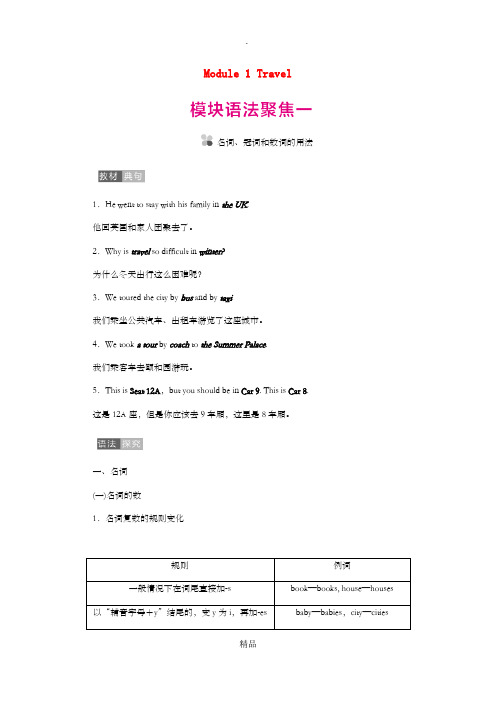
Module 1 Travel名词、冠词和数词的用法1.He went to stay with his family in the UK.他回英国和家人团聚去了。
2.Why is travel so difficult in winter?为什么冬天出行这么困难呢?3.We toured the city by bus and by taxi.我们乘坐公共汽车、出租车游览了这座城市。
4.We took a tour by coach to the Summer Palace.我们乘客车去颐和园游玩。
5.This is Seat 12A,but you should be in Car 9. This is Car 8.这是12A座,但是你应该去9车厢,这里是8车厢。
一、名词(一)名词的数1.名词复数的规则变化规则例词一般情况下在词尾直接加s book—books, house—houses 以“辅音字母+y”结尾的,变y为i,再加es baby—babies,city—cities复数形式,作主语时,谓语动词用①________形式。
(2)“定冠词the+姓氏名词的复数”表示“……一家人(夫妇)”,作主语时,谓语动词用②________形式。
2.名词复数的不规则变化3.(1)只将③________名词变为复数形式。
如:a banana tree―→some banana treesa boy student―→some boy students(2)man和woman作定语时,其本身的单复数形式与被修饰词的单复数④________。
如:a man doctor―→two men doctorsa woman teacher―→three women teachers4.不可数名词“量”的表示方法(1)用some, much, a little, little, a lot of, lots of, an amount of, a bit of, plenty of等表示多少。
初中英语九年级下Module 1 Travel外研版知识点练习

—We are going to Taiwan for vacation.
—________.
A、Good luck
B、I"m sorry to hear that
C、Have a good time
D、Congratulations
【答案】:
--Take it easy! Grades are not our whole life.
A、be worried about
B、be pleased with
C、be good at
D、be good for
【答案】:
【解析】:
根据短文理解填空。
Have you ever seen Along the River During the Qingming Festival? Almost everyone has heard of this painting in his h______class. But how m______do you know about the famous painting?
A、well
B、nice
C、wonderfully
D、nicely
【答案】:
【解析】:
--Listen! Someone is playing the piano.
--Wow! beautiful music! I like it very much.
A、What
B、How a
C、What a
D、How
A、gets on
B、gets off
C、got on
D、got off
2019-2020年外研版英语九年级下Module 1 Travel习题精选
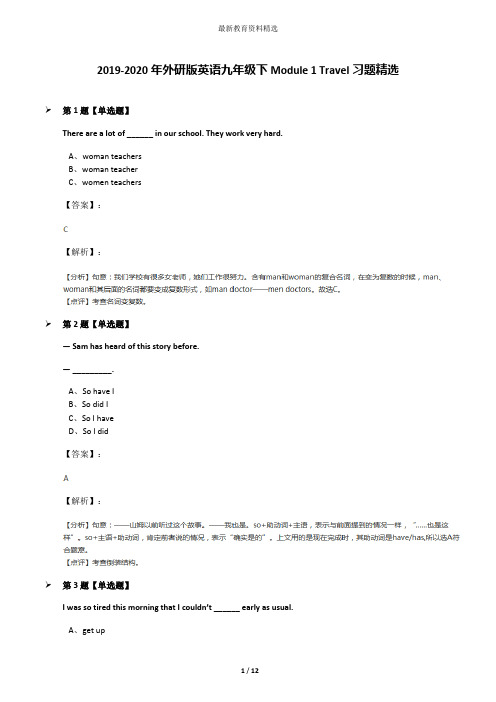
There are a lot of ______ in our school. They work very hard.
A、woman teachers
B、woman teacher
C、women teachers
【答案】:
A、sure
B、surprised
C、ited
D、happy
【答案】:
【解析】:
John had a short walk after lunch, ______?
A、did he
B、didn"t he
C、had he
【答案】:
【解析】:
When you are swimming, _______your ears. You can use earplugs(耳塞) to stop water getting into your ears.
A、breathe the fresh air
B、enjoy the view of the Thames
C、climb A-li Mountain
The information above may come from a ______.
A、driving school
B、travel service
【解析】:
— Sam has heard of this story before.
— _________.
A、So have I
B、So did I
C、So I have
D、So I did
【答案】:
【解析】:
I was so tired this morning that I couldn’t ______ early as usual.
最新精选初中九年级下英语Module 1 Travel外研版习题精选
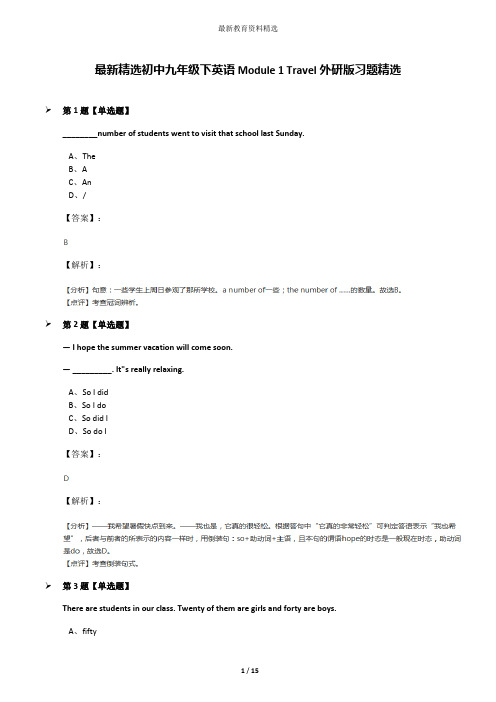
C、Take your time
D、It takes no time
【答案】:
【解析】:
____ of the students in my class ___ girls
A、One third ; is
B、One third ; are
C、Two third ; is
最新精选初中九年级下英语Module 1 Travel外研版习题精选
________number of students went to visit that school last Sunday.
A、The
B、A
C、An
Dope the summer vacation will come soon.
A、A ; a
B、A; /
C、The ; /
D、The ; a
【答案】:
【解析】:
They had planted 10,000 trees of last month.
A、in the end
B、to the end
C、at the end
D、by the end
【答案】:
【解析】:
--Listen! Someone is playing the piano.
— _________. It"s really relaxing.
A、So I did
B、So I do
C、So did I
D、So do I
【答案】:
【解析】:
There are students in our class. Twenty of them are girls and forty are boys.
九年级英语下册 Module 1 Travel模块语法聚焦练习 (新版)外研版
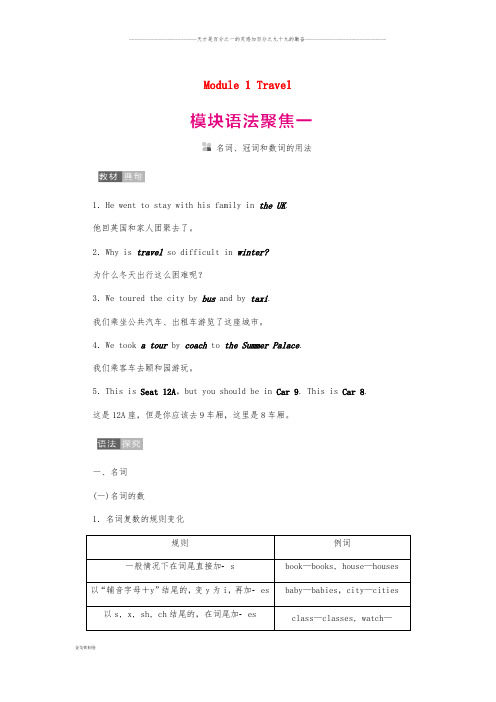
Module 1 Travel名词、冠词和数词的用法1.He went to stay with his family in the UK.他回英国和家人团聚去了。
2.Why is travel so difficult in winter?为什么冬天出行这么困难呢?3.We toured the city by bus and by taxi.我们乘坐公共汽车、出租车游览了这座城市。
4.We took a tour by coach to the Summer Palace.我们乘客车去颐和园游玩。
5.This is Seat 12A,but you should be in Car 9. This is Car 8.这是12A座,但是你应该去9车厢,这里是8车厢。
一、名词(一)名词的数1.名词复数的规则变化规则例词一般情况下在词尾直接加s book—books, house—houses 以“辅音字母+y”结尾的,变y为i,再加es baby—babies,city—cities 以s, x, sh, ch结尾的,在词尾加es class—classes, watch—[提示] (1)maths(数学),politics(政治),physics(物理),news(消息)等名词以s 结尾,但不是复数形式,作主语时,谓语动词用①________形式。
(2)“定冠词the+姓氏名词的复数”表示“……一家人(夫妇)”,作主语时,谓语动词用②________形式。
2.名词复数的不规则变化3.复合名词的复数形式(1)只将③________名词变为复数形式。
如:a banana tree―→some banana treesa boy student―→some boy students(2)man和woman作定语时,其本身的单复数形式与被修饰词的单复数④________。
九年级英语下册module1travel模块测试题(新版)外研版
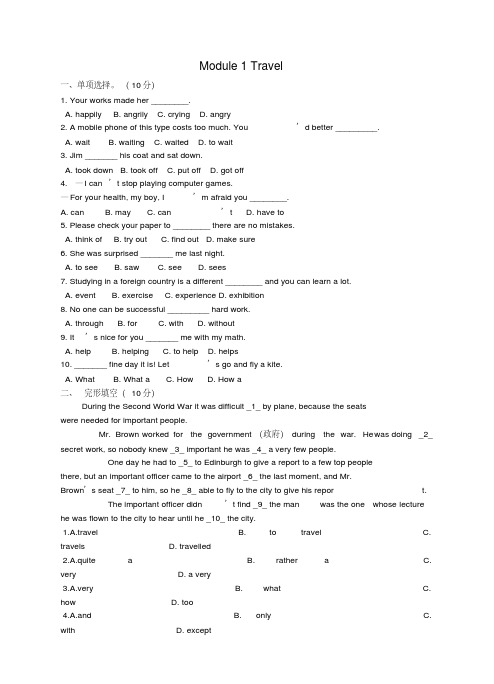
Module 1 Travel一、单项选择。
(10分)1. Your works made her ________.A. happilyB. angrilyC. cryingD. angry2. A mobile phone of this type costs too much. You’d better _________.A. waitB. waitingC. waitedD. to wait3. Jim _______ his coat and sat down.A. took downB. took offC. put offD. got off4. —I can’t stop playing computer games.—For your health, my boy, I’m afraid you ________.A. canB. mayC. can’tD. have to5. Please check your paper to ________ there are no mistakes.A. think ofB. try outC. find outD. make sure6. She was surprised _______ me last night.A. to seeB. sawC. seeD. sees7. Studying in a foreign country is a different ________ and you can learn a lot.A. eventB. exerciseC. experienceD. exhibition8. No one can be successful _________ hard work.A. throughB. forC. withD. without9. It’s nice for you _______ me with my math.A. helpB. helpingC. to helpD. helps10. _______ fine day it is! Let’s go and fly a kite.A. WhatB. What aC. HowD. How a二、完形填空(10分)During the Second World War it was difficult _1_ by plane, because the seatswere needed for important people.Mr. Brown worked for the government(政府)during the war. He was doing _2_ secret work, so nobody knew _3_ important he was _4_ a very few people.One day he had to _5_ to Edinburgh to give a report to a few top peoplethere, but an important officer came to the airport _6_ the last moment, and Mr.Brown’s seat _7_ to him, so he _8_ able to fly to the city to give his repor t.The important officer didn’t find _9_ the man was the one whose lecture he was flown to the city to hear until he _10_ the city.1.A.travel B. to travel C. travels D. travelled2.A.quite a B. rather a C. very D. a very3.A.very B. what C. how D. too4.A.and B. only C. with D. except5.A.fly B. by plane C. flew D. flown6.A.in B. at C.on D. by7.A.gave B. given C. was given D. was give8.A.can’t B. wasn’t C. won’t D. didn’t9.A.what B. how C. that D. which10.A.reached B. got C. arrived D. left三、阅读理解(20分)AThere are many things we need to know, but we do not learn them at school. For example, if we want to use our money wisely, we need to shop carefully. We need to know howto compare the prices of the same things in different shops. We also need to knowhow to make the best decision when we shop. It is a life skill, and we need topractice it in our daily life.Supermarket WBusiness hours: 6:00 am--10:30 pmEggs (1 kilo): £6.50 Apples(1 kilo): £3.80 Pork(1 kilo): £18.20 Tomatoes(1 kilo): £1.58 Environment: Very good Service: Excellent Supermarket MBusiness hours: 5:30 am--10:30 pm Eggs (1 kilo): £6.60Apples(1 kilo): £3.96Pork(1 kilo): £18.20 Tomatoes(1 kilo): £1.50 Environment: Very goodService: GoodSupermarket YBusiness hours: 6:00 am--10:00 pmEggs (1 kilo): £6.20 Apples(1 kilo): £3.30 Pork(1 kilo): £17.20 Tomatoes(1 kilo): £1.30 Environment: Need improving Service: Ordinary Supermarket ZBusiness hours: 6:00 am--9:30 pm Eggs (1 kilo): £6.90Apples(1 kilo): £3.90Pork(1 kilo): £18.60 Tomatoes(1 kilo): £1.60 Environment: OrdinaryService: Bad根据短文内容.判断下列句子正“T”误“F”.正确为错误为。
九年级英语下册 Module 1 Travel模块语法专练课件 (新

语法精讲
冠词 1.不定冠词a/an的用法:an用于以元音音素开头的单词前;a用于以辅音音素开头的单 词前。 2.定冠词the的用法记忆口诀: 特指双方熟悉,上文已经提及;世上独一无二,方位名词乐器;某些专有名词,外加复数 姓氏;序数词最高级,习惯用语要特记。 3.不用冠词的用法记忆口诀: 下列情况不用冠,名词之前代词限;复数名词表泛指,球类学科和三餐;专有名词不可 数,星期月份季节前;交通手段和节日,习惯称谓和头衔。
模块语法专练
语法精讲
名词 1.名词的数。 ( 1 )可数名词复数的构成: ①一般情况下,直接在名词后加-s或-es。 ②不规则变化的词需要特别记忆,如man—men,foot—feet,child—children,mouse— mice等。 ③有些单词单复数同形,如sheep等。 ④一般情况下,复合名词的单复数形式体现在最后一个名词上,如a pencil box—pencil boxes等。但如果是由man,woman构成的复合名词,其变为复数时,两个词都要变为复数, 如a man teacher—men teachers等。 ( 2 )不可数名词数量的表达: 不可数名词一般不能用具体的数来计量,但可以和some,any,a lot of,plenty of等词连用。 不可数名词还可以借用量词来表示量的概念,如a piece of news“一则新闻”,two pieces数词构成规律:1~12单独记,13~19词尾teen;20~90整十位,-ty结尾是后缀;几十几, 连字符“-”莫忘记;几百几,hundred 后面and立。 2.基数词变序数词:1、2、3要全变,其他-th加后面,8去t,9去e,5和12 ve变f,ty要变tie。 3.序数词在使用时,通常前面要加定冠词the,但是如果序数词前出现不定冠词a/an,则 表示“再一,又一”。 4.hundred,thousand,million与数词连用时通常不加-s,但若用于表示数百、数千、数百 万这样的泛指概念时,则用复数。如two hundred students,hundreds of students等。
- 1、下载文档前请自行甄别文档内容的完整性,平台不提供额外的编辑、内容补充、找答案等附加服务。
- 2、"仅部分预览"的文档,不可在线预览部分如存在完整性等问题,可反馈申请退款(可完整预览的文档不适用该条件!)。
- 3、如文档侵犯您的权益,请联系客服反馈,我们会尽快为您处理(人工客服工作时间:9:00-18:30)。
Module 1 Travel名词、冠词和数词的用法1.He went to stay with his family in the UK.他回英国和家人团聚去了。
2.Why is travel so difficult in winter?为什么冬天出行这么困难呢?3.We toured the city by bus and by taxi.我们乘坐公共汽车、出租车游览了这座城市。
4.We took a tour by coach to the Summer Palace.我们乘客车去颐和园游玩。
5.This is Seat 12A,but you should be in Car 9. This is Car 8.这是12A座,但是你应该去9车厢,这里是8车厢。
一、名词(一)名词的数1.名词复数的规则变化规则例词一般情况下在词尾直接加s book—books, house—houses 以“辅音字母+y”结尾的,变y为i,再加es baby—babies,city—cities以s, x, sh, ch结尾的,在词尾加es class—classes, watch—watches[提示] (1)maths(数学),politics(政治),physics(物理),news(消息)等名词以s结尾,但不是复数形式,作主语时,谓语动词用①________形式。
(2)“定冠词the+姓氏名词的复数”表示“……一家人(夫妇)”,作主语时,谓语动词用②________形式。
2.名词复数的不规则变化3.复合名词的复数形式(1)只将③________名词变为复数形式。
如:a banana tree―→some banana treesa boy student―→some boy students(2)man和woman作定语时,其本身的单复数形式与被修饰词的单复数④________。
如:a man doctor―→two men doctorsa woman teacher―→three women teachers4.不可数名词“量”的表示方法(1)用some, much, a little, little, a lot of, lots of, an amount of, a bit of, plenty of等表示多少。
(2)用单位词表示,即“数词+单位名词+of+不可数名词”来表达,其中单位名词根据数词确定其⑤________。
如:a cup of tea, two pieces of news等。
(二)名词所有格1.有生命的名词所有格2.名词+of+名词(无生命的或有生命的名词)。
如:the name of the book the children of the family3.“所有物+of+名词加's”结构或“所有物+of+名词性物主代词”,即为⑥________所有格。
如:a friend of my father's a pen of mine二、冠词(一)不定冠词(a/an)的用法1.泛指某一类人或某一类事物。
2.表示“一个”,相当于one,但数量观念不强。
3.表示人或物,但不具体说明何人或何物。
4.表示“每一(个)”。
5.用于不可数的抽象名词前,表示某种具体的情况或概念。
6.用在一些固定词组中。
如:a few; a little; a lot of; in a hurry; have a look[提示] a用于⑦____________开头的单数可数名词前,an用于⑧____________开头的单数可数名词前。
如:an honest boy一个诚实的男孩;a university一所大学(二)定冠词(the)的用法1.用在“特指”谈话双方都知道的某个人或某些人或物前。
2.用在上文已提到的人或事物前。
3.用在世界上独一无二的事物前。
如:the moon月球4.用在序数词或形容词最高级前。
5.用在单数可数名词前表示一类人或事物。
6.用在由普通名词构成的专有名词前。
如: the Great Wall长城7.用在表示方位或西洋乐器的名词前。
如:play the piano弹钢琴8.与某些形容词连用表示一类人。
如:the old老人9.用于固定词组中。
如:in the end最后;at the age of在……岁时(三)零冠词的用法1.专有名词、泛指的不可数名词以及泛指的复数名词。
2.称呼或表示官衔、职位的名词。
3.季节、月份、节假日、日期、星期等表示时间的名词。
4.表示球类运动、游戏或表示三餐的名词。
5.已有人称代词、指示代词或不定代词作定语的名词。
6.⑨________与交通工具连用,表示一种方式时,中间无冠词。
7.某些习语或固定词组中的名词前不用任何冠词。
如:go to bed去睡觉;in hospital住院三、数词(一)基数词的用法1.hundred, thousand, million等表示确切数目时,用⑩________形式,不和of连用;当表示不确切数目时,其词尾要加s,和⑪________连用。
2.表示在某个世纪的几十年代,用“in the+整十的基数词的复数”。
基数词的复数若用阿拉伯数字表示,可直接加s。
如:in the 1990s在20世纪90年代3.表示年龄(1)表示某人的确切年龄,用“⑫________+years old”或“at the age of+基数词”,也可以直接用基数词。
(2)表示某人几十多岁这样的约略年龄,用“in one's+整十的基数词的复数(如twenties, thirties等)”来表达。
(二)序数词的构成及用法1.序数词的构成序数词一般由“基数词+th”构成;以y结尾的基数词构成序数词时,先把y变为i,再加eth。
[助记]基变序,有规律,词尾要加th。
一二三,特殊记,词尾分别t,d,d(first, second, third)八去t,九去e,ve要用f替。
ty变作tie,再加th莫忘记。
若遇几十几,只变个位就可以。
2.序数词的用法(1)序数词前必须加the。
(2)序数词前若有限定词,则可以不加the。
如:It is my third time to Beijing.这是我第三次到北京。
(3)序数词前面也可以加不定冠词a或an,表示“⑬____________”,内含顺序性。
如:We've tried it three times. Must we try it a fourth time?我们已经试过三遍了,还必须试一次(第四次)吗?(三)分数的构成和用法1.构成:分数由基数词和序数词合成。
分子用基数词,分母用序数词。
分子是1时,分母(序数词)用⑭________形式;分子大于1时,分母用⑮________形式,序数词加s。
2.用法:用分数表示几分之几或百分之几的人或物时,须在分数或百分数和人或物之间加of。
若充当主语,谓语动词的数须与of后的名词⑯________。
Ⅰ.单项填空( )1.2017·天津Shenzhen is on ________ coast near Hong Kong. It was ________ small village many years ago.A.a; the B.the; aC./; / D.the; the( )2.2017·泰州Dangal(《摔跤吧!爸爸》), ________ Indian film, has become one of ________ most popular films in China.A.a; / B.a; theC.an; the D./; the( )3.2016·黄石—What did you do last night, Bob?—First I did my homework, and then I played ________ piano for half ________ hour.A.the; a B./; anC.the; an D.a; the( )4.2017·天水The online shop sells ________ shoes at a very low price.A.child and men'sB.children and men'sC.children's and menD.children's and men's( )5.2017·东营Nowadays some ________ made in China are both good and cheap, such as Xiaomi mobile phones, Haier fridges and Lenovo computers.A.tools B.productsC.materials D.instruments( )6.2016·龙东The Belt and Road Initiative(一带一路倡议) will help China improve the ________ with those related countries, especially Pakistan.A.relationship B.agreementC.environment( )7.2017·南充—Are you thirsty?—Yes, please give us ________.A.three bottle waterB.three bottle of waterC.three bottles of waterD.three bottles of waters( )8.2017·咸宁—Who won the first prize of the ________ World Table Tennis Championship?—You mean the match held in ________? Ma Long did.A.fi ftyfour; GermanB.fiftyfourth; GermanyC.fiftyfourth; GermanD.fiftyfour; Germany( )9.2017·潍坊—“Food Safety” has become one of the hott est topics recently.—Yeah, it receives________ Internet hits a day.A.thousands B.thousands ofC.thousand D.hundreds( )10.2016·丹东—Have you heard of TFBOYS?—Certainly.About ________ teenagers love them very much in our school.A.hundreds B.two hundreds ofC.two hundreds D.two hundredⅡ.用适当的冠词填空并完成对话A: I'm really looking forward to 1.________ summer holiday. We're taking 2.________ trip to 3.________ Paris!B: How wonderful! It's 4.________ interesting and beautiful city. How long will 5.________ flight take?A: The flight takes about 6.________ hour. When we arrive, we will get to our hotel by 7.________bus. 8.________hotel is right in 9.________ centre of 10.________ city, so we can visit all 11.________ famous places.B: Are you planning to visit 12.________ Louvre Museum?A: Yes, we are.详解详析【语法探究】①单数②复数③被修饰④一致⑤单复数⑥双重⑦以辅音音素⑧以元音音素⑨by⑩单数⑪of ⑫基数词⑬又一,再一⑭单数⑮复数⑯保持一致【实战演练】Ⅰ.1.B 考查冠词的用法。
